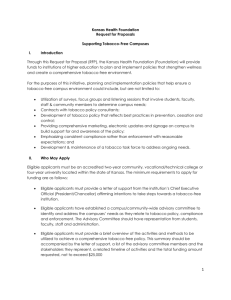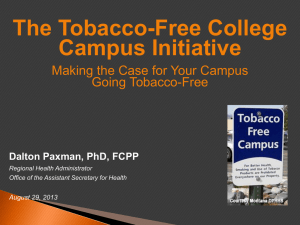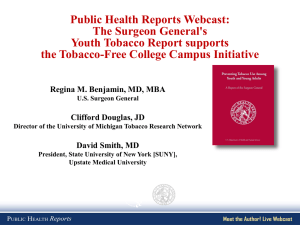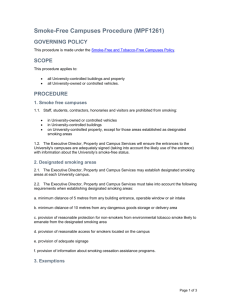Talking Points and FAQs - National Tobacco
advertisement
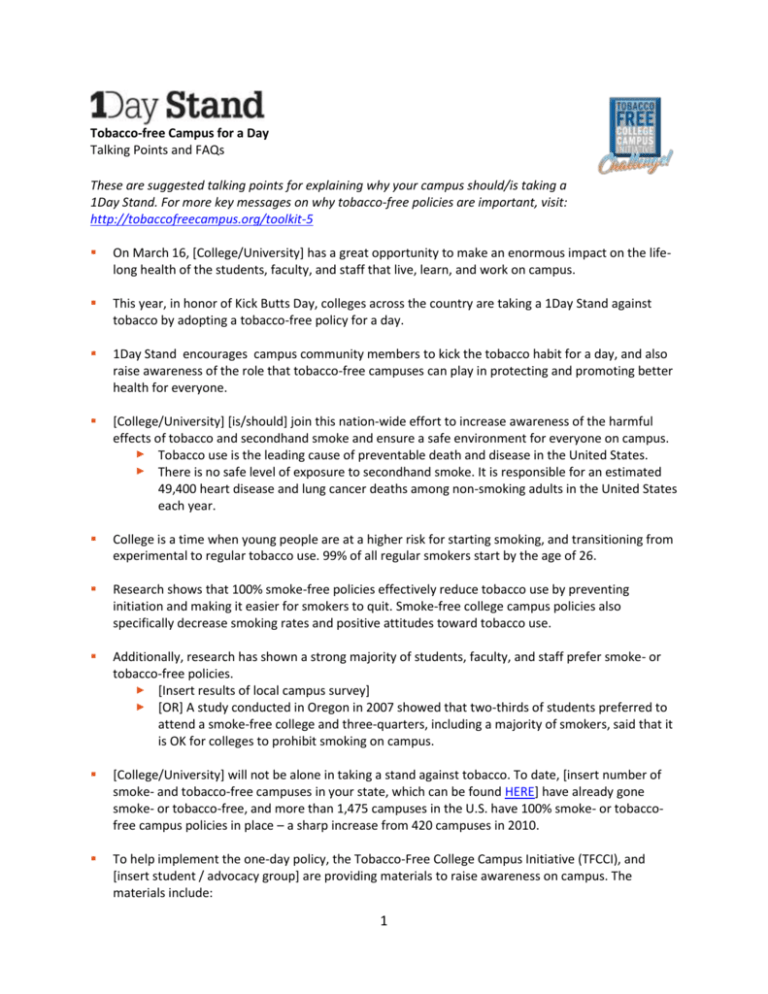
Tobacco-free Campus for a Day Talking Points and FAQs These are suggested talking points for explaining why your campus should/is taking a 1Day Stand. For more key messages on why tobacco-free policies are important, visit: http://tobaccofreecampus.org/toolkit-5 On March 16, [College/University] has a great opportunity to make an enormous impact on the lifelong health of the students, faculty, and staff that live, learn, and work on campus. This year, in honor of Kick Butts Day, colleges across the country are taking a 1Day Stand against tobacco by adopting a tobacco-free policy for a day. 1Day Stand encourages campus community members to kick the tobacco habit for a day, and also raise awareness of the role that tobacco-free campuses can play in protecting and promoting better health for everyone. [College/University] [is/should] join this nation-wide effort to increase awareness of the harmful effects of tobacco and secondhand smoke and ensure a safe environment for everyone on campus. ► Tobacco use is the leading cause of preventable death and disease in the United States. ► There is no safe level of exposure to secondhand smoke. It is responsible for an estimated 49,400 heart disease and lung cancer deaths among non-smoking adults in the United States each year. College is a time when young people are at a higher risk for starting smoking, and transitioning from experimental to regular tobacco use. 99% of all regular smokers start by the age of 26. Research shows that 100% smoke-free policies effectively reduce tobacco use by preventing initiation and making it easier for smokers to quit. Smoke-free college campus policies also specifically decrease smoking rates and positive attitudes toward tobacco use. Additionally, research has shown a strong majority of students, faculty, and staff prefer smoke- or tobacco-free policies. ► [Insert results of local campus survey] ► [OR] A study conducted in Oregon in 2007 showed that two-thirds of students preferred to attend a smoke-free college and three-quarters, including a majority of smokers, said that it is OK for colleges to prohibit smoking on campus. [College/University] will not be alone in taking a stand against tobacco. To date, [insert number of smoke- and tobacco-free campuses in your state, which can be found HERE] have already gone smoke- or tobacco-free, and more than 1,475 campuses in the U.S. have 100% smoke- or tobaccofree campus policies in place – a sharp increase from 420 campuses in 2010. To help implement the one-day policy, the Tobacco-Free College Campus Initiative (TFCCI), and [insert student / advocacy group] are providing materials to raise awareness on campus. The materials include: 1 ► ► ► ► Posters and table-tents that we can post on campus in the student union building, residencies, health centers, and other frequently trafficked areas. An article for our student newspaper and a PSA we plan to read on the campus radio station and share with local radio outlets to broadcast to a wider audience. Social media content to share with students and post on the campus’s Twitter and Facebook account. [If not already administered] A campus survey to gauge campus support for adopting a longterm smoke- or tobacco-free policy. [Insert any additional innovative ways your organization plans to raise awareness on campus.] Background on the 1Day Stand The 1Day Stand is sponsored by the Tobacco-Free College Campus Initiative (TFCCI), a campaign administered by the U.S. Department of Health and Human Services aimed at getting all colleges and universities throughout the country to go smoke- or tobacco-free. Difficult FAQs Do smoke- and tobacco-free policies really reduce tobacco use and improve health? Smoke- and tobacco-free campus policies can have a tremendous impact on the health of an entire campus community. Tobacco use is the leading cause of preventable death and disease in the United States, and according to the U.S. Surgeon General, there is no safe level of exposure to secondhand smoke. A 100% smoke-free policy can effectively reduce tobacco use by preventing initiation and making it easier for smokers to quit. Smoke- and tobacco-free college campus policies also specifically decrease smoking rates and positive attitudes toward tobacco use. Will there be strong resistance from students, faculty, or staff? Research shows that a strong majority of students, faculty, and staff prefer smoke- or tobacco-free policies. For example, a survey conducted in Oregon in 2007 showed that two-thirds of students preferred to attend a smoke-free college and three-quarters – including a majority of smokers – said that it is OK for colleges to prohibit smoking on campus. Students understand secondhand smoke is a health hazard. That’s why most students don’t smoke and the majority of those who do have tried to quit in the past year. Does a smoke- or tobacco-free policy impede on another person’s rights? Everyone has a right to breathe clean air where they live, work, study, and play. Colleges and universities have a responsibility to provide a safe environment for students, staff, and visitors – and a right to regulate any activity on campus that affects the health and safety of the community. A smoke- or tobacco-free policy does not prohibit people from using tobacco products – it simply prohibits their use on campus, where they can affect others’ enjoyment of community property. What’s the difference between a smoke- and tobacco-free policy? 2 A “smoke-free” policy prohibits any tobacco product that emits smoke from being used anywhere on campus at any time (e.g. cigarettes, cigars). A “tobacco-free” policy is more comprehensive and prohibits both non-combustible tobacco products (e.g. smokeless tobacco) and any tobacco product that emits smoke from being used anywhere on campus at any time. Of the colleges and universities that have already implemented a policy, nearly two-thirds have chosen to be tobacco-free, according to the Americans for Nonsmokers’ Rights Foundation. Why not just provide designated smoking areas? Secondhand smoke has proven to travel outside of designated areas. Designated areas have also been found to encourage tobacco use by creating a social environment for daily and non-daily tobacco users. By increasing the number of individuals smoking in one area, students are more likely to believe that more people smoke than actually do. This misperception affects the norm of smoking on campus and may also contribute to increased tobacco use. Designated areas are often heavily littered and smell of toxic tobacco waste. Unless regularly cleaned and maintained, these areas are unhealthy, smelly, and an eyesore. How much work is involved in going smoke- or tobacco-free? Adopting a smoke- or tobacco-free policy takes time and planning—but the work is often shared among a taskforce of engaged campus advocates. Depending on the campus, it may take one to two years by the time an official policy is developed, voted on, and/or implemented by campus administration. That’s why starting now and using a thoughtful process—including developing a taskforce, drafting an action plan, and conducting outreach and education about the intent and benefits of a new policy—is so important. By agreeing to take the 1Day Stand, our campus will receive a toolkit of creative materials that students and faculty can print and use on campus, and a list of innovative ways to raise awareness on campus and encourage ongoing dialogue. Campuses that decide to join the TFCCI Challenge will also receive technical assistance on the specific steps to going smoke- or tobacco-free. What does a smoke- or tobacco-free campus policy entail? A 100% smoke- or tobacco-free policy prohibits the use of any smoke emitting and/or tobacco products anywhere on campus property at all times. Policies typically include the following information: The definition of smoking and tobacco products (e.g. smokeless products, hookah, e-cigarettes) Where smoking and tobacco use is prohibited (e.g. student housing, parking lots, campus vehicles) Who the policy applies to (e.g. students, faculty, staff, visitors) Americans for Nonsmokers’ Rights Foundation has developed model tobacco-free campus policy -http://www.no-smoke.org/pdf/modeluniversitytobaccofreepolicy.pdf Some policies also prohibit the promotion of tobacco products anywhere on campus and in campus publications. Keep in mind that policy work is about more than simply passing and implementing a policy. A successful policy change process includes strong education and outreach to prepare the campus for the policy change, and tobacco cessation services and information to support tobacco users who want to quit. 3

